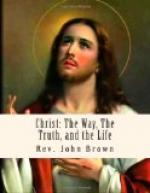4. The knowledge of Christ is all. Know him, and we know heaven and the way to it; for upon this ground doth Christ make good what he said, touching their knowing whither he went, and the way; and answereth the objection that Thomas did propose, viz. because he was the way, &c., and they being acquaint with him, (which here is presupposed,) were not ignorant of the place whither he was going, nor of the way leading thither. The knowledge then of Jesus Christ is a true and full compend of all saving knowledge. Hence it “is life eternal to know him,” John xvii. 3. “They that know him, know the Father,” John xiv. 9. and viii. 19. “They that see him, see the Father also,” John xiv. 9. “He is in the Father, and the Father in him,” John xiv. 10, 11. and x. 38. and xvii. 21. And so knowing him they know heaven; for what is heaven else but the presence and glorious manifestations of the Father; for when Christ speaks of his going to heaven, he saith, “He was going to the Father.” So knowing him, they know the way, both how Christ was to go to heaven as our cautioner, head, and attorney, and how we must follow.
Let then a man have never so much knowledge, and be acquainted with the mysteries of all arts and sciences, and with the depths of nature, and intrigues of states, and all the theory of religion; if he be unacquainted with Jesus, he knoweth nothing as he ought to know.
And upon the other hand, let a poor soul that is honest, and hath some knowledge of, and acquaintance with him, be satisfied, though it cannot discourse nor dispute, nor speak to cases of conscience, as some others; if we know him, it matters not though we be ignorant of many things, and thereby become less esteemed of by others. Here is the true test, by which we may take a right estimate of our own, or of others’ knowledge. The true rule to try knowledge by, is not fine notions, clear and distinct expressions, but heart-acquaintance with him; “in whom are hid all the treasures of wisdom and knowledge,” Col. ii. 3.
O sad! that we are not more taken up in this study, which would be a compendious way for us to know all? Why spend we our money for that which is not bread, and our labour for that which will not profit us? Why waste we our time and spirits in learning this science, and that art; when, alas! after we, with much labour and toil, have attained to the yondmost pitch there, we are never one whit the nearer heaven and happiness? yea, it were well, if we were not further off! Oh! if we were wise at length, and could think more of this one thing necessary; and could be stirred up to learn more of him, and to make this the subject of all our study and labour.




